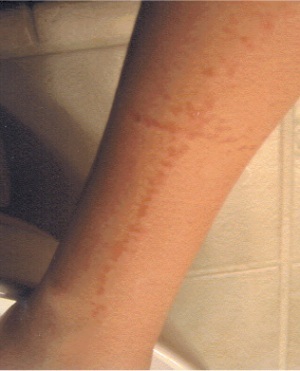Hemant Mehta's Blog, page 1909
October 7, 2014
Ray Comfort on Stephen Hawking: “The Bible Says He’s a Fool”
Physicist Stephen Hawking recently came out (explicitly) as an atheist, leading Ray Comfort, on his online show, to call him a fool.
Let me repeat that: Creationist Ray Comfort thinks one of the most brilliant people to ever live is a “fool”… for not accepting what’s written in the Bible literally.
That makes about as much sense as, well, Sarah Palin calling Stephen Hawking a fool.
The Bible says he’s a fool. You know, if we disagree with the Bible, when someone says “I’m an atheist,” they’re saying “I’m a fool.” They’re saying nothing created everything. Which is just ludicrous. It’s intellectual suicide. The Bible says he who denies God’s existence is a fool. And if we say the guy is intelligent, then we’re denying what scripture says.
Yep, God poofed us into existence in six days makes way more sense…
I’m sure Hawking is devastated by the thought of contributing to “intellectual suicide” by the guy who thinks bananas prove God’s existence.
(via Danthropology)
Why Do Many Atheists Still Eat Animals?
If you’re a Humanist, and you believe all living beings are near or distant cousins — branches of a larger evolutionary tree — how does that impact your diet? How does that change how you treat animals?
Kim Socha believes animal liberation is a direct extension of her non-religious philosophy, and her new book Animal Liberation and Atheism (Freethought House, 2014) is all about why we need to pay more attention to this subject.
An excerpt from the book’s introduction is below:
Greek mythology (a religious belief system no longer in vogue) tells the story of Procrustes, a smith, thief, and torturer. When not roaming the paths between Athens and Eleusis looking for people to rob, Procrustes would invite travelers into his home to rest for the evening. He would then proceed to fit them to his bed. If one was too short for the bed, he would stretch him out (the name Procrustes means “the stretcher” or “he who stretches”). If one was too tall, he would hack away at her limbs until she fit properly. And lest we think anyone could ever survive the “the subduer,” Procrustes actually had two beds. If an unsuspecting traveler fit one bed, his tormenter would move him to the other and stretch or hack as the situation demanded.
The idea of the “Procrustean bed” has been adopted and adapted into contemporary vernacular with slightly different meanings depending on the context. The idea of the Procrustean bed is most often used to signify (and I go no further than the online Free Dictionary here) “[a]n arbitrary standard to which exact conformity is forced.” I will show that religious arguments for animal rights, emancipation, and advocacy, despite the compassion behind them, merely hack away at or stretch the parameters of religion to make animal liberation fit what is essentially an anthropocentric, speciesist, hierarchical belief system that fails to speak to the liberation of nonhuman animals.
I do not address each individual religion throughout human history to explain why it is ultimately not animal-friendly, although I will take specific religions to task. Rather, my purpose is to explore how the very concept of religion — the belief in a higher power, in whatever form it may take — is antithetical to liberating nonhumans from the human perception that other species are ours to do with as we please. Of course, some religions are considerably kinder to animals than others, but there is not one that claims nonhuman animals and human animals have an equal claim to personhood or parity. Similarly, the secular community has been slow to acknowledge what a lack of human exceptionalism means to how we treat other animals. When that association is made by atheist luminaries such as Richard Dawkins (see his essay “Gaps in the Mind,” to which I will later refer), they do not follow up with appropriate action such as going vegan or vegetarian, or becoming advocates for nonhuman animals. Thus, a further purpose of this book is to explore the lack of interest in animal concerns within the secular world and to inspire freethinkers to think more seriously about the other animals with whom we share the Earth.
…
For those with religious authority, religion-as-tool is an avenue for the domination of animal-kind, humans included, and the Earth’s resources. Like Procrustes’ bed, religion is a device that has been repeatedly used to harm others. Any time religion has been used to deceive, violate, and discriminate, it is violence. And as one who believes that gods, goddesses, demons, spirits, divine mandates, and other supernatural concepts are made up and often abused by humans in power, I argue that religion is in a perpetual state of deception. It is up to the individual to decide whether to use religion. Thus, my intentions herein are to dismantle the bed and expose it as a dangerous apparatus, but one on which you need not lie. And if you do find solace there, I ask that you critically analyze its foundation. The pillows and blankets may feel comforting, but you are prostrate, meaning both lying down and powerless. The other-than-human animals upon which Western civilization is built are prostrate and slaughtered by the billions every year. Religion allows, even sanctions and demands, this avoidable butchery.
At this point, perhaps you are wondering what became of Procrustes. The answer to that will extend the metaphor and clarify the purposes of this book. He was killed by the Greek hero Theseus upon the very bed on which he had mutilated countless victims. Fritz Graf notes that Theseus represented a new kind of hero in ancient Greece, one more progressive than brutes such as Hercules; indeed, Graf calls Theseus a “civilizer.” Procrustes, and by extension his tortuous bed, was destroyed by a civilizing and enlightening force. Theseus “made the road from Troezen to Athens safe for travelers. He is shown clearing the road of all sorts of bandits” and other malicious men who threw people off cliffs, crushed them, tore at them. To me, that is what atheism does. It clears the road through and to secular enlightenment so that, for example, people of the same gender (or no identifiable gender) can live without fear of social exclusion; it allows women education and influence; it negates the need for human children to have their genitals mutilated; and it challenges any of the other myriad atrocities enacted in the name of an imperceptible deity. At this point, however, atheism does not adequately speak for other-than-human animals. They too need the path cleared so they can go about their business, even if that business is killing other animals for survival, without the human interference that so often manifests as abuse. The purpose of this text is to begin that conversation, which should be of interest to animal advocates and those in the secular community. Ideally, it will interest anyone who wishes to live in a less violent and more just world.
Animal Liberation and Atheism is available on Amazon beginning today.
Bill Nye’s Forthcoming Book About Evolution
I’ll just put this here so you can all drool over it:
Undeniable: Evolution and the Science of Creation comes out on November 4.
Can’t wait to read Ken Ham‘s review of it…
October 6, 2014
Friendly Atheist Podcast Episode 23: Juhem Navarro-Rivera, Research Associate with PRRI
Our latest podcast guest is Juhem Navarro-Rivera, research associate at the Public Religion Research Institute. PRRI publishes some of the most important and credible surveys when it comes to tracking religious demographics in the United States.
This episode is sponsored by Be Secular. Readers of this site can get a 10% discount on products by using the promo code “Friendly”!
Before joining PRRI, Juhem was a research fellow at the Institute for the Study of Secularism in Society and Culture at Trinity College, where he served as the lead analyst for many studies, including the landmark American Religious Identification Survey. He also taught political science and Latino Studies at the Puerto Rican and Latino Studies Institute at the University of Connecticut.
We spoke with Juhem about how PRRI collects its data, whether the results themselves can draw criticism, and how to grow the diversity within the atheist movement.
We’d love to hear your thoughts on the podcast. If you have any suggestions for people we should chat with, please leave them in the comments, too.
You can subscribe to the podcast on iTunes, get the MP3 directly, check it out on Stitcher, or just listen to the whole thing below.
And if you like what you’re hearing, please consider supporting this site on Patreon and leaving us a positive rating!
WaPo Reporter Gene Weingarten, a Pulitzer Prize Winner, Wrote “Me & Dog,” a Children’s Book on Godlessness
The Washington Post‘s Gene Weingarten is one of the best journalists in the country. He jumped onto my radar screen five years ago, with a truly gut-wrenching feature article about distracted parents who leave their young child in a hot car without realizing it, with tragic consequences.
Another story of his, a lovely tribute to aging dogs and how they process their memories, is equally unforgettable.
Others value his talents at least as much as I do — Weingarten is the recipient of two Pulitzer Prizes. Today I learned that he is also an atheist (although that particular “secret” was out years ago; I just missed it). More importantly, he says he isn’t going to take the incessant Christian drumbeat in the U.S.A. lying down anymore. After Weingarten noticed the ocean of religious books for children, and the paucity of atheism-themed kids’ books, he penned Me & Dog, a riff on power and religion. Here’s the Amazon description:
[T]o Murphy, Sid’s faithful dog, Sid is the whole world. Murphy thinks Sid is the absolute best — and that he’s in charge of everything. Sid loves Murphy right back, but he can’t help but wonder what Murphy would think if he realized the truth: Sid’s just a kid, and Murphy’s just a dog, and neither one can control the world.
This deceptively simply picture book is the perfect start to a discussion about a subject seldom seen in children’s books — the nonthreatening feel of a world based on fact and reason, and not faith.
Weingarten was interviewed on the NPR show On the Media on Friday, and opined that his book is gentle, not hostile or subversive.
The central message, he says, is this:
What if this world of ours is not based on presumptions of magic? What if this world is really ‘What we see is what we get’… Would that be so bad? … There is a secular magic in everything around us. The world is beautiful, we have love, we should take care of each other. That is not a frightening concept for any parent to deliver to a child.
He told a Washington Post interviewer last month that the idea for the book came to him when he stepped on his dog’s paw.
The whole book was created in four seconds of insight. My dog — like the one in the book — is named Murphy. I stepped on her foot, she howled and then asked me, clearly: “What have I done wrong? What did I do? I won’t do it again.” The whole idea flashed in my mind: I am her God! …
This is a book that is a sweet little book. It’s not hectoring anyone, but it’s trying to start a conversation with a very young person: What if things happen just because?
Weingarten explains that, while he isn’t an anti-theist, religion strikes him too often as
… exclusionary, prescriptive, and, well, superstitious.
Murphy the dog will never realize that… but with a little help, the Sids of this world just might.
This Saturday, Atheists Will Participate in the AIDS Walk Los Angeles and You Can Help
The AIDS Walk Los Angeles is a phenomenal event that has happened every year since 1985. About 30,000 people, all walking together in a powerful symbol of unity and determination, have raised more than $77 million over the years for the AIDS Project Los Angeles and more than two dozen other organizations giving vital services to people living with AIDS.
Last October, I participated for the first time, walking with the Atheists United team. With the help of several readers (thank you!), fourteen members of our team raised $1,320, giving us a ranking of 185 out of more than 1,500 teams, and fifth among the 39 non-profit organization teams.
Not bad for a bunch of selfish, hedonistic nihilists with no morals, eh?
Resplendent in our bright red Atheists United t-shirts, we made an impressive phalanx as we walked the 10 kilometer (6.2 mile) route through West Hollywood. Thousands of walkers and many more thousands of spectators saw us.
We got great public call-outs and acknowledgement from the announcers along the route, and we were able to chat with people who were curious about us and about atheism in general. It was great to help a good cause and also destroy negative stereotypes in the process.
It was so much fun that, all year, I’ve been looking forward to doing this again, and I need your help to make it materially successful for helping people with AIDS. Please visit my donation page here, and donate what you can. Because of credit card processing fees, the minimum donation the site can accept online is $25. If you would rather donate less (Thank you very much, sincerely!) you can either combine your donation with someone else who uses their credit card or mail a good old-fashioned check to:
AIDS Walk Los Angeles
PO Box 933005,
Los Angeles, CA 90093-3005
Be sure to write “Sponsoring Richard Wade / Atheists United” in the memo portion. Make the atheists rock stars this year!
Church Kicks Out Alcoholics Anonymous Group For Fear They’ll Be Forced to Host Gay Weddings
In Keithville, Louisiana, a church has banned an Alcoholics Anonymous group from meeting on its premises for fear that they’ll later be forced to hold same-sex weddings.
Last month, Pastor David Venable of Westwood Baptist Church (not to be confused with the Westboro Baptist Church) sent a letter to the leaders of the AA group, letting them know that if the church came across as tolerant enough to host AA meetings, they would eventually be required to marry same-sex couples as well.
“As I am sure you are aware, God’s church, his written word, and its values and principles have come under a constant and aggressive attack from the homosexual and lesbian community,” the letter read. “Church’s and businesses alike, across our nation, are being forced, by our legal system, to accommodate these groups in the use of their buildings/facilities to perform marriages ceremonies, receptions, etc. The court’s decision was based on the fact that the churches/businesses were accepting and accommodating other public entities and therefore must also accommodate the homosexual and lesbian community.”
It’s worth noting here that even if marriage equality were legalized nationwide, no church will ever be forced to perform same-sex weddings, according to Adrienne Critcher of the Louisiana group People Acting for Change and Equality.
“They have every protection, gay people have no protection, so who is it that should be afraid of being victimized,” said People Acting for Change and Equality political director, Adrienne Critcher.
“They say they are not out to get anyone, but they singled out homosexuals as having some agenda that they are trying to force on the Baptist Church.”
The root of their fear, apart from general hatemongering from extreme right-wingers, is a court decision from New Jersey back in 2012. In that decision, a lesbian couple won the right to hold their wedding at a church pavilion, but only because the church held a tax-exempt status requiring their property to be free for public use.
The pastors at Westwood Baptist — and conservative Christian leaders everywhere — are concerned that similar rulings in their states could mean churches being forced to hold same-sex weddings against their will. But as Think Progress eloquently explains, that’s not the case at all:
Various conservative groups have often claimed that the public’s slow embrace of marriage equality will eventually lead to chaplains and churches being forced to perform gay weddings. But gay rights groups and federal officials have repeatedly insisted that this is not the case, and that religious leaders and institutions will never be required to perform a marriage ceremony that violates their beliefs. In fact, some gay activists have openly supported measures to guarantee churches the right to decide who they marry: In 2013, James Dabakis (D), Utah’s only openly gay legislator, voiced support for an amendment to the state’s constitution protecting churches who do not wish to perform same-sex weddings, saying “No sane person I know of wants to coerce or force any religion to perform any ceremony that they are not comfortable with.”
So because this church is so terrified of being seen as gay-friendly, a group that has genuinely benefited from them for five years is booted out. Commenters on other articles about this have guessed that Westwood is making a poor excuse to disaffiliate with AA. That might be the only explanation; otherwise, these two individual acts of prejudice don’t have much to do with each other.
(Image via Shutterstock)
Are American Believers a Selfish Lot? In Prayer, the Answer Appears To Be Yes.
If you need a little help winning the lottery, or you just want your favorite sports team to win, try asking the Almighty. It won’t actually work, but you’ll be in good company.
From Sarah Pulliam Bailey at Religion News Service:
When Americans aren’t busy praying for themselves or their own needs — and most of them are — many are seeking divine intervention on behalf of a favorite sports team or the golden ticket in the lottery, according to a new survey.
 Other eye-catching results: Five percent of respondents prayed for someone’s relationship to end; seven percent prayed for a parking spot; 14 percent prayed for God to avenge someone who did them wrong; 15 percent prayed that no one would find out about a “bad thing” they did; and 20 percent asked God to grant success in something they’d put virtually no effort into.
Other eye-catching results: Five percent of respondents prayed for someone’s relationship to end; seven percent prayed for a parking spot; 14 percent prayed for God to avenge someone who did them wrong; 15 percent prayed that no one would find out about a “bad thing” they did; and 20 percent asked God to grant success in something they’d put virtually no effort into.
None of that seems to accord with what Jesus supposedly taught. The same is true for God’s son’s exhortation that we love our enemies and pray for them. Only 37 percent of praying Americans have ever asked the Lord to smile upon their enemies.
More about the scope and methodology of the project here.
Supreme Court Denies Appeal of Preachy Creationist Science Teacher Who Burned a Cross in His Student’s Arm
In a case that’s lasted more than six years, there’s finally a happy resolution in the legal battle between Creationist teacher John Freshwater and the Mount Vernon City School District Board of Education.
A quick refresher: In 2008, school board members voted 5-0 to fire Freshwater, a Mount Vernon Middle School science teacher, after learning that he had preached Creationism to the students, handed out flyers in class urging kids to attend a presentation by the “Answers in Genesis” ministry, left the Bible out on his desk during class even after being told to stop, hung a Ten Commandments sign in his classroom, offered extra credit to students who watched the Ben Stein pro-Intelligent Design movie Expelled, and burned a student in the arm with a Tesla coil… in the shape of a cross:
That set off a long appeals process that led to a 4-3 decision by the Ohio Supreme Court last year in favor of the district. The Court said the district was right to fire Freshwater for his insubordination.
The decision held little back:
Freshwater not only ignored the school district’s directive, he defied it. After he was directed to remove the items, Freshwater deliberately added to them, incorporating the Oxford Bible and Jesus of Nazareth into the classroom. He then refused to remove his personal Bible from his desk, and refused to remove a depiction of former President George W. Bush and Colin Powell and others in prayer from his wall.
…
Freshwater is fully entitled to an ardent faith in Jesus Christ and to interpret Biblical passages according to his faith. But he was not entitled to ignore direct, lawful edicts of his superiors while in the workplace.
It was a victory for anyone who opposed proselytization in public schools.
But, as expected, Freshwater’s legal team appealed that decision to the U.S. Supreme Court.
This morning, the Court released a list of cases they will hear and those they will not. Amidst the chaos of gay marriage becoming legal in a handful of states as a result of the Court not hearing those appeals, the Freshwater appeal was also rejected:
Let’s hope the Freshwater saga is finally over. He won’t be back in a public school classroom anytime soon and this decision should put a stop to further attempts. He was unqualified to teach science, his district was right to fire him, and he’s finally left with no option but to accept that.
(Large portion of this article were published earlier)
Is Religious Discrimination Okay if You Didn’t Know You Were Doing Anything Wrong? The Supreme Court Will Soon Decide
On Thursday, the Supreme Court declared that it would hear a religious hiring discrimination case, stemming from a Tulsa, Oklahoma Abercrombie & Fitch store’s decision in 2008 not to hire then 17-year-old Samantha Elauf because she wore a hijab.
What makes this case particularly interesting is that Abercrombie & Fitch is openly admitting that their refusal to hire Elauf was based on her wearing the hijab and not some other reason. They argue that this was not an instance of religious discrimination, though, because they didn’t have “actual knowledge” that wearing the hijab was religious.
Business Week reports that Samantha Elauf
… had been told by a friend who worked for the retailer that wearing a hijab wouldn’t be a problem — as long as it wasn’t black. Sales associates can’t wear black at Abercrombie.
During her interview, Elauf wore a head scarf and the assistant manager scored her style a 6, which was good enough to be hired. When the assistant manager sought approval for Elauf’s hijab, though, a supervisor said the head scarf didn’t meet Abercrombie’s look policy [which, at the time, did not permit the wearing of hijabs; this has since been changed]. Hats are not allowed at Abercrombie. The supervisor later said he didn’t know that Elauf wore the scarf for religious reasons. Elauf wasn’t hired.
The Equal Employment Opportunity Commission sued on Elauf’s behalf, and a federal judge found that Abercrombie’s decision was in fact a violation of Title VII of the Civil Rights Act of 1964. This decision was then overturned by the 10th U.S. Circuit Court of Appeals, which sided with Abercrombie, saying that since Elauf had not given direct, explicit notice that she needed a religious accommodation, no discrimination had taken place.
At the heart of what the Supreme Court will decide, then, is whether direct, explicit notice is always necessary.
Abercrombie argues that this is the case — that applicants “are not permitted to remain silent and to assume that the employer recognizes the religious motivations behind their fashion decisions.” The EEOC, on the other hand, argues that a prospective employee cannot know be expected to know a potential employers’ rules beforehand, in order to know what conflicts might arise (and thus, what accommodations are needed). They also point out that, as Elauf wore a distinctly religious garment to her interview, Abercrombie had “enough information about an employee’s religious needs to permit the employer to understand the existence of a conflict between the employee’s religious practices and the employer’s job requirements.”
It will interesting be to see what the Supreme Court decides. Abercrombie’s defense seems to hinge on the merest technicality: that Elauf did not explicitly state that the religious garment she was wearing was a religious garment. And, from my perspective, that seems like a very shallow defense. Elauf was not wearing an ambiguous garment, or even an obscure one; the religious nature of the hijab is widely known (and easily ascertained). Should ignorance be an excuse for intolerance, intentional or not? Abercrombie has already settled two religious discrimination cases stemming from the “look policy,” in which they fired or refused to employ Muslim women because they wore hijabs. This seems like another instance that would have been best served by admitting discrimination, settling, and moving on.
For more on the case, see the SCOTUS blog.
(Image via Northfoto / Shutterstock.com)
Hemant Mehta's Blog
- Hemant Mehta's profile
- 39 followers














